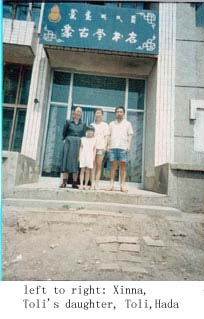
WASHINGTON, July 25-The Chinese government has deported the
estranged wife of an Inner Mongolian opposition leader, apparently
for political reasons, Radio Free Asia (RFA) reports.
Authorities at Beijing Airport refused to allow Tao Li, a
Chinese citizen who lives in Germany, to enter the country
after her flight landed there July 23. She was deported back
to Germany two hours after landing in Beijing, according to
her husband, Inner Mongolia People's Party chairman Temtsiltu
Shobtsood. Tao flew to Beijing on Tuesday with the couple's
16-year-old daughter and the seven-year-old son of a German
friend, Shobtsood said in an interview with RFA’s Mandarin
service.
Before leaving Germany, Tao had telephoned the Chinese embassy
about her planned visit and was told it would pose “no
problem.” She was turned back on two previous attempts
to enter China, in December 1998 and July 1999, Shobtsood
said. After Tao failed to enter China in 1999, an official
at the Chinese embassy in Germany told her she had been barred
from her native country because of "evidence she had
participated in politics."
The couple's daughter and the German boy were allowed to
enter and travel on to Hohhot, capital of China’s Inner
Mongolian Autonomous Region, where they planned to visit Tao's
widowed mother.
"My wife is not interested in politics and has never
participated in any political activity or organization,"
Shobtsood said. "This is guilt by association, especially
since my wife and I have been separated for two years."
"My wife holds a valid Chinese passport. She is a Chinese
citizen," he said.
Oyunbilig, executive chairman of the Inner Mongolia People's
Party, described his organization as an advocate for human
rights and democracy in the Mongolian region under Chinese
control. Because of Mongolia's relative proximity to Beijing,
he said, the Chinese central government imposes stricter controls
on the region than on Tibet or Xinjiang. Inner Mongolia, Xinjiang,
and Tibet all ostensibly enjoy autonomy, although the Chinese
government in fact keeps all three regions under tight control.
Dissidents have long been active in Inner Mongolia--a vast,
arid region of about 24 million people that came under Chinese
communist control in 1947--but news reports about them are
extremely rare.
In its annual review of human rights around the world, Human
Rights Watch noted that in 2001, Inner Mongolian police had
“detained activists associated with the Southern Mongolian
Democratic Alliance, which seeks to promote Mongolian traditions
and cultural values.” The government accuses the group
of “splittist” activities, the New York-based organization
said.
Also in 2001, police detained Altanbulag, a young musician,
for distributing materials relating to human rights and ethnic
problems in Inner Mongolia. Authorities also banned works
by two young Mongolian poets and in October detained one of
them, Unag, for several weeks, Human Rights Watch said.
RFA Today’s Special Report ( 2 )
2002/7/25
[ Radio Free Asia, translation by Enhebatu Togochog] The
wife of an Inner Mongolian dissident Mr. Xi Hai Ming who lives
in Germany, has been refused to enter China at Beijing’s
Capital Airport on Wednesday and forcefully returned to Germany.
The following is a report by Radio Free Asia correspondent
Xia Ai Ming.
Mr. Xi Hai Ming who lives in Germany said to the correspondent
that the purpose of his wife Toli’s visit to Inner Mongolia
is to see her mother and to spend her summer vocation in China
with her 16-year-old daughter. However, on Wednesday Ms. Toli
was refused to enter the country at Beijing’s Capital
Airport and forcefully returned to Germany. Her daughter has
been allowed to enter China. Xi Hai Ming said that previously
his wife Toli was refused twice to enter China in Beijing
even if the trips were planned to see her father who was suffering
from a terminal cancer.
Xi Hai Ming also revealed that his wife Toli who has already
been separated from him for two years holds a valid Chinese
passport. Before leaving Germany, Toli telephoned the Chinese
Embassy to Germany about the possibility of her entry to China
and was told positively. However, she was refused to enter
in Beijing. About his wife’s bitter experience, Mr. Xi
Hai Ming has expressed his sympathy and helplessness.
The Inner Mongolian People’s party was founded in 1997
in the United States. The executive director of Inner Mongolian
People’s Party, Mr. Oyunbilig who is living in the United
States, has introduced the Party’s constitution and short
term goals, ( voice ). About the reason why the Party aims
at Inner Mongolian independence, Oyunbilig said, (voice).
The Southern Mongolian Human Rights Information Center, a
New York-based human rights organization, revealed that Ms.
Toli, the Inner Mongolian People’s Party president Mr.Xia
Hai Ming’s wife, is not the only victim. Since 1998,
at least 7 Inner Mongolians who live in overseas have been
refused to enter the country or detained and questioned after
the their entries. Among those 7, except the former vice president
of Inner Mongolian People’s Party, the rest of 6 have
no relationship with any political organization.
Mr. Xi Hai Ming has sent a statement to the Chinese government
on his wife’s case, ( voice ).
The Inner Mongolian People’s Party, known as “Inner
People’s Party” ( Nei Ren Dang in Chinese ), was
established in the United States in 1997. In history, the
“ Inner People’s Party” had emerged twice.
The first one was the “Inner Mongolian People’s
Revolutionary Party” established in Chuluulalt Haalag
( known as “Zhang Jia Kou” ) whose goal was to obtain
“autonomy”. The second one was the “Inner Mongolian
People’s Revolutionary Party” established again
by eastern Inner Mongolian young intellectuals in 1945, which
was disbanded later and some of its members have accepted
the Chinese Communist Party’s leadership.
<Back>
|





